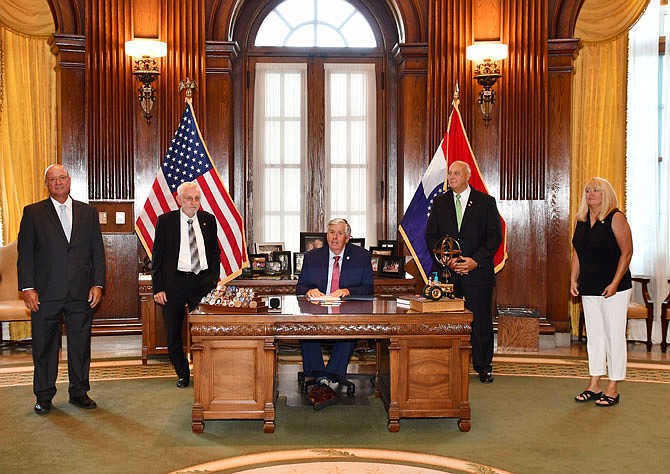Local and state officials on Tuesday celebrated a land transfer that could lead to new economic development possibilities for Jefferson City and Central Missouri.
In a private event in his office, Gov. Mike Parson signed a bill transferring 116 acres of state-owned land just east of the Ike Skelton Training Facility to the Heartland Port Authority for a Missouri River port in Jefferson City. The Legislature sent the bill to the governor at the end of the legislative session in May.
A public ceremony to mark the occasion was later held at Jefferson City's Rotary Park.
State Rep. Rudy Veit, R-Wardsville, and state Sen. Mike Bernskoetter, R-Jefferson City, sponsored the legislation.
Veit credited state Rep. Becky Ruth, R-Festus, who serves as chair of the House Transportation Committee, with providing needed support to get the measure passed.
"This port is so instrumental not only to Jefferson City but to the rest of the ports we have in the state," Ruth said. "We have a big project coming to our state with American Patriot Holdings (based in Miami), which is planning to build a a new container vessel. All the ports are working together to make this happen, and I'm glad Jefferson City will be a part of that. These ships will help us move products up and down the Missouri and Mississippi rivers quicker and cheaper than now and will affect how we import and export products."
Ruth said ports are one of the biggest economic producers in the state, providing a 7-1 return on investment.
Heartland Port Authority Board Chair Rick Mihalevich said the next step is a $120,000 USDA Rural Development Grant for preliminary planning purposes including archaeological and historical preservation studies and preliminary engineering design. This planning phase will be completed as a step toward site development and future funding opportunities.
Mihalevich said the Heartland Port authority Board will continue working on the report released in May by Iowa-based Decision Innovation Solutions on products that could be enhanced by operation of the planned port. The report showed a 24-county area could use the port in Central Missouri, stretching as far north as Audrain County and as far south as Laclede County.
The forestry industry could take advantage of the port to export products, as well as agricultural items such as soybeans and wheat, according to the report.
The DIS study indicated Boone, Moniteau, Cole, Callaway, Osage, Miller and Maries counties were the primary draw area for agriculture products that could come into the port. They estimated 2.1 million bushels of soybean exports could be moved through, and soybeans have the highest potential for profitability among agricultural products that would come through the port.
As for a potential business model, DIS suggested a landlord port model concept.
This would have the Heartland Port Authority executing a concession agreement with an entity that pays a fee to operate the port. The report indicated this entity likely would be a marine river terminal operator or a grain trader.
Under a shared investment concept, the Heartland Port Authority could install major infrastructure at the site to help the port be more viable and attract potential investors. Under the same concept, DIS officials said, the concessionaire could be required to invest in specialized infrastructure, equipment and operational expenditures.
Missy Bonnot, Jefferson City Area Chamber of Commerce interim president and economic development director, said the land transfer would help with the Port Authority's current need for more funds.
The Port Authority's primary funding source now is administrative money from the Missouri Department of Transportation.
Missouri Department of Transportation officials said the Heartland Port would get an additional point under the department's funding system for having a capital asset thanks to governor approving the land transfer, Bonnot said. The Heartland Port would receive $37,442 in administrative funds - up $13,971 from the port's fiscal year 2020 amount of $23,471, according to MoDOT.
Despite the increase in state funds that comes with the land transfer, Bonnot said they are still searching for ways to get more money for the port.

